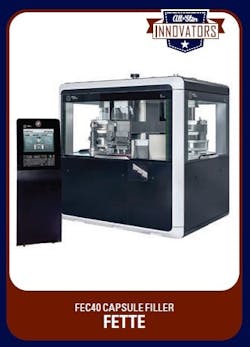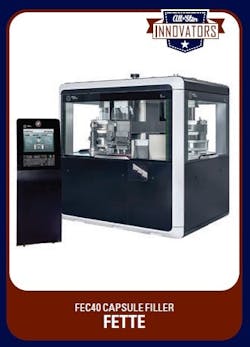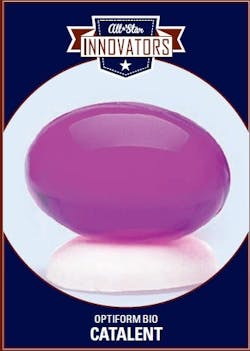Any successful baseball player knows that the key to unlocking greatness lies in thinking ahead to the next play — figure out exactly what pitch the ace is about to throw, or exactly when that baserunner is about to break — and you are one step ahead of the competition. Back this forward-thinking philosophy with a talented team, and you have a sure winner.
Now introducing this year’s All-Star Innovators: technologies and systems launched within the last 12 months that, based on their relative applicational and technical merits, were selected by Pharmaceutical Manufacturing’s editors and reviewers to be on this year’s All-Star Innovators Roster.
ANALYTICAL AND MONITORING DEVICES
Analytical and monitoring devices are essential for a field that requires precision, reliability and repeatability. Pharmaceutical products must be able to demonstrate perfect quality, and the right analytical tools are needed to not only obtain, but validate and maintain that quality.
Leading off in this category is Keit’s microFTS, a Fourier Transform Infrared (FTIR) spectrometer developed with a novel optical design for improved in-line process monitoring. The instrument was originally developed for the space program, making it inherently smaller, lighter and more rugged than current systems, and able to function despite extreme environmental vibration. The microFTS has no moving parts, setting it apart from other FTIRs, and enabling a new standard for real-time liquid-state analyses.
Pharmaceutical analysis experts, Chiralabs, ran tests using multiple common substances to find out how consistently the microFTS would perform. The reports confirmed the microFTS’ ability to detect and analyze common solvents used in pharmaceutical, chemical and petro-chemical industries with high consistency.
BrightSpec has developed a rapid and chromatography-free quantitative sampling method for the ppm analysis of low volatility impurities in solid powders and complex liquids. This application of FT-MRR (Fourier transform molecular rotational resonance) using millimeter waves in the 260-290 GHz range is the first purely spectroscopic approach to a problem that is usually constrained to the realm of Gas Chromatography Mass Spectrometry.
The BrightSpec product and services portfolio uses FT-MRR spectroscopy in the microwave range (2-8 GHz) to perform three essential chiral analysis measurements: 1. Quantitative analysis of diastereomers produced in the synthesis of molecules with multiple chiral centers. 2. Quantitative enantiomeric excess measurements for chiral molecules. 3. Determination of the three-dimensional structure of a chiral molecule.
Currently, each of these analyses requires different measurement technologies that are expensive, time consuming and highly technical. In order to meet the needs of target markets, BrightSpec is developing instruments that can perform this analysis on molecules in drug discovery applications.
Batting in the power spot is WIKA’s Diaphragm Monitoring System. The system alerts operators immediately if the diaphragm in a seal assembly fails, helping prevent contamination of the process media and unscheduled downtime.
Diaphragm seals are installed to help maintain the integrity of process media for product safety and quality. However, repeated exposure to harsh chemicals and extreme conditions can weaken the diaphragm membrane and cause it to fail. This failure can go undetected, leading to possible process contamination.
WIKA’s monitoring system is designed with primary and secondary diaphragms. If the primary diaphragm is breached, it will trigger a visual, audio or electrical alert. The secondary diaphragm will continue to function, providing reliable pressure readings until repairs can be made.
BIOPROCESSING
Bioprocessing equipment encompasses bioreactor vessels and all related equipment needed to maintain a streamlined reaction within a sterile environment. As the demand for biopharmaceuticals grows, drug manufacturers are looking for new strategies to meet these global needs. Often this results in the need to create more efficient bioprocessing systems and employ single-use technology to reduce cleaning and production costs.
First up, ITT Corporation’s Engineered Valves brand has launched a new line of hygienic diaphragm valves — Pure-Flo EnviZion — designed to dramatically reduce maintenance time and total cost of ownership for today’s biopharma manufacturing facilities.
EnviZion’s embedded technologies allow for a more streamlined installation and maintenance process, delivering less downtime, longer preventative maintenance cycles and greater production capacity. Assembled with a simple mount and turn motion, the valve is installed in approximately three minutes without using special tools or difficult torqueing procedures. The valve’s 360-degree active seal protection provides leak-free operation, helping eliminate the risk of contamination and the need to re-torque after thermal cycling.
Comecer offers a solution to small batch vial filling needs with their aptly named Baby Phill machine. Baby Phill is ideal for producing batches for clinical trials or for R&D aseptic filing, where the development of cytotoxic, liquid or lyophilized drugs in a sterile, contained, grade A environment is needed.
The small aseptic filling machine is integrated inside an isolator or RABS as part of a complete production line. The filling line also offers one-button sterilization via a built-in Vapor-Phase Hydrogen Peroxide (VPHP) generator.
The Cadence Acoustic Separator (CAS) from Pall Life Sciences applies acoustic wave separation technology in a novel single-use format for the clarification of cell culture bioprocess fluids. The CAS provides robust, reliable cell and protein yields in a closed system. The technology provides a single-use primary clarification solution that delivers quality that is equivalent to centrifugation without the scaling, footprint and cleaning issues common with this solution.
Pall’s acoustic wave separation technology was introduced as an enabling tool for customers to bridge the critical gap between the bioreactor and the downstream processing train.
The separator is an easy-to-use technology without the volume limitations experienced by depth filtration solutions that lead to large footprint and buffer consumption or the need for process additives to enhance the performance.
Batting cleanup in this category is GE Healthcare Life Sciences’ KUBio Biomanufacturing Solution. KUBio consists of prefabricated modules equipped with the heating, ventilating, air conditioning (HVAC) system and all the piping necessary to run a biomanufacturing plant.
The solution creates biomanufacturing capacity by delivering a fully functional, ready-to-run facility in 14-18 months. The facility can be equipped with GE’s integrated FlexFactory single-use biomanufacturing platform, or a hybrid processing platform.
Pharmaceutical Manufacturing selected two heavy hitters for this important category. With a production output of up to 400,000 capsules per hour, Fette Compacting America’s FEC40 sets new standards in the efficiency of capsule filling machines. The filling machine accomplishes this elevated production level in a remarkably small footprint, making machine reconfiguration due to floor space issues unnecessary.
The high ratio of performance-to-footprint is made possible by Fette’s patented Duplex Concept, which enables the FEC40 to feature a dual capsule filling process. The result is significant production savings (up to 30 percent per 1,000 capsules).
The FEC40’s productivity level is a result of applying the principles the company used in the development of its double rotary tablet presses. With the FEC40, separate process steps have been merged for capsule filling, with the resulting free stations used for dual arrangement of the filling process in the machine, thereby doubling output. As the filling process fully complies with established production standards, users can apply all tried-and-tested process parameters for capsule filling and further optimize when necessary.
MG America’s next-generation PLANETA 200 Capsule Filler 200 produces up to 200,000 capsules per hour, but its primary advantage is flexibility — its modular design results in a highly configurable platform suitable for a wide array of production requirements, including an ability to fit several dosing units simultaneously, enabling one capsule to be filled with differing products.
The capsule filler is also scalable. For example, it can initially be configured for medium speeds, then upgraded later for maximum speeds, reaching different performances depending on the number and type of dosing units installed. Its weight control system also can be upgraded post-installation. The machine can be equipped with isolators satisfying different containment levels, as well as various washing systems ranging from Wet-In-Place to Wash/Clean-In-Place automatic systems.
WHEATON boasts a true “utility player’ when it comes to drug packaging. The company’s breakthrough technology allows for the manufacture of plastic exterior components with complete interior coverage of pure glass. The new technology fits the bill for applications where having both materials in one product has long been needed.
The innovative concept results in packaging products that have the best of both worlds: the lightweight, break resistant properties of plastic with the barrier qualities and inert inner surface of pure glass. The technology is broadly applicable across the bulk of the company’s product range.
The Videojet 7510 50-Watt fiber laser marker offers high contrast marking on robust plastic packaging, metal containers and other industrial products even at fast line speeds up to 440m/min. Small in size yet powerful in performance, the 7510 enables manufacturers to mark crisp, clear codes to meet demands for increased throughput and more code content.
The laser marker helps pharmaceutical and medical device companies navigate traceability requirements. In addition, its high-speed capability and large marking window directly address the growing need for increased lines speeds and maximized throughput.
INFORMATION TECHNOLOGIES
Today’s pharmaceutical companies are dealing with a data explosion. Forward-thinking manufacturers have realized that this data — whether generated internally or externally — is a tremendous asset with many uses. Suppliers are responding by offering new data analytic capabilities which, when used correctly, can transform a company’s business model.
Along these lines, our first IT All Star goes to Veeva Systems. Veeva’s Vault QMS is intended to replace disparate, on-premise quality systems to manage global quality processes across an organization — including external partners.
While the majority of manufacturers have implemented a quality management system, these systems often are only applicable within a company’s four walls. The Vault QMS application incorporates external partners into the full spectrum of quality processes, including deviations, complaints, internal and external audits, corrective and preventive actions, and change control. This reduces compliance risks and eliminates production bottlenecks.
PLM Direct, a new solution from Mettler Toledo, offers a cost-effective way to implement serialization in manufacturing plants. It’s an ideal introduction to serialization for companies that do not require aggregation and do not use multiple production lines in parallel. It is also a potential tool for contract packers needing a short-notice serialization solution to fulfill an order.
PLM Direct offers serialization capability that involves no major integration investment or restructuring of complex production lines, while still enabling pharmaceutical companies to implement the latest anti-counterfeiting guidelines. The software solution networks individual stations easily and directly with manufacturers’ existing MES, ERP and cloud solutions for serialization purposes.
RESEARCH & DEVELOPMENT
Last, but certainly not least, a category that is crucial to the long-term success of the pharmaceutical industry. As manufacturers are looking to accelerate development and reduce risk in early phases, there are many early phase development challenges to overcome.
The service enables molecules to be evaluated across multiple technologies for a fixed price. In just 12 weeks, a dedicated adviser from Catalent will provide a recommended path forward for a company’s molecule based on data, shipping to its facility the necessary animal PK study materials to enter animal trials with an optimal product faster.
And there you have it: The 2016 Pharmaceutical Manufacturing All-Star lineup. Congratulations and thank you for your contributions to the pharma game!
About the Author
Karen P. Langhauser
Chief Content Director, Pharma Manufacturing
Karen currently serves as Pharma Manufacturing's chief content director.
Now having dedicated her entire career to b2b journalism, Karen got her start writing for Food Manufacturing magazine. She made the decision to trade food for drugs in 2013, when she joined Putman Media as the digital content manager for Pharma Manufacturing, later taking the helm on the brand in 2016.
As an award-winning journalist with 20+ years experience writing in the manufacturing space, Karen passionately believes that b2b content does not have to suck. As the content director, her ongoing mission has been to keep Pharma Manufacturing's editorial look, tone and content fresh and accessible.
Karen graduated with honors from Bucknell University, where she majored in English and played Division 1 softball for the Bison. Happily living in NJ's famed Asbury Park, Karen is a retired Garden State Rollergirl, known to the roller derby community as the 'Predator-in-Chief.'




